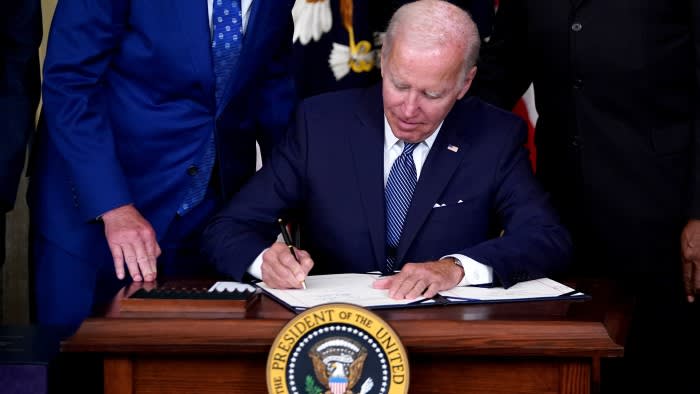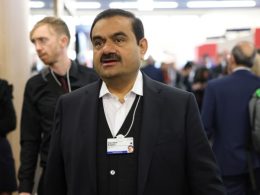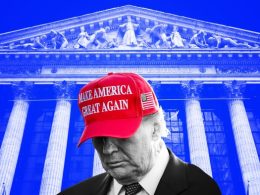There is little we know for certain about next week’s presidential election except, perhaps, that the winner will not be the man currently living in the White House.
Despite the occasional gaffe that pushes him back into the headlines, Joe Biden has become something of an afterthought since he bowed out of the race in July, making a forgettable, late-night appearance at the Democratic convention in Chicago before disappearing from the campaign trail almost entirely.
But whoever wins on November 5, election day will also mark the beginning of what will inevitably be a months-long, elite-level debate over Biden’s legacy — one that will be inextricably tied to the contest’s result.
If Kamala Harris loses on Tuesday, partisans will point Biden’s way (perhaps rightfully) and argue it was his stubborn refusal to step aside at the start of the campaign that robbed the Democratic party of a much-needed competitive race to anoint its next generation of leadership. If Harris wins, his late exit will probably be assessed more generously, as the selfless act of an ageing leader who put his country before himself.
But as monumental as his decision to withdraw from the race was, no presidency can be judged on a single act alone, and the four years Biden has held office have been among the most consequential of any presidency in modern political history. On top of managing two major international conflicts (three, if you count his ill-fated withdrawal from Afghanistan), Biden has a domestic legislative record that must be reckoned with.
Indeed, while one-term presidencies are generally derided or overlooked by political historians (think Warren Harding or Gerald Ford) there are a handful significant enough to warrant their own place in the pantheon, like George HW Bush or Jimmy Carter (whose foreign policy achievements were so consequential that they are the subject of a highly anticipated new book by a certain FT columnist). Biden is likely to go down as more Bush than Harding.
It is difficult in the current political season to judge Biden on anything other than the issues at the forefront of the ongoing campaign, none of which paint him in a positive light. His presidency was bedevilled by a stretch of high inflation that has become the pre-eminent issue on voters’ minds, and his Middle East diplomacy has been undone by an Israeli prime minister whose conduct of war has repeatedly crossed American red lines with little consequence.
But I suspect historians will prioritise two other achievements when judging Biden’s legacy. In Ukraine, he marshalled a moribund Nato alliance to back a small, unproven military so it could battle the vaunted Russian army to a standstill, severely hampering the Kremlin’s ability to pursue any further military adventurism in the “near abroad”.
Biden has been beset by criticisms that he slow rolled American military aid due to a misbegotten fear of triggering a wider war with Russian President Vladimir Putin. But it’s easy to forget how his record compares to his one-time boss Barack Obama, who responded to Putin’s incursion into Georgia by inexplicably re-establishing friendly ties as part of a “reset” with Moscow, and then farmed out Russia policy to then German Chancellor Angela Merkel and mid-level State Department officials after Putin’s “little green men” took Crimea and much of the Donbas in 2014. Biden restored American leadership in Nato, and with Finland and Sweden now in the fold, will leave the alliance far stronger than he inherited it.
Domestically, Biden’s ludicrously misnamed Inflation Reduction Act is not only the single biggest piece of climate legislation on the international stage, but it has halted the deindustrialisation of the American economy — an unrealised goal of nearly every president since the turn of the century.
Critics can argue whether Biden’s industrial policy is good economics; governments are historically terrible at picking private sector winners. But the amount of investment in battery and electric vehicle plants that can be directly tied to the IRA’s tax incentives is hard to deny. Add the IRA to a
boomlet in chip manufacturing facilities unleashed by Biden’s Chips Act, as well as the projects begun under his bipartisan $1.2tn infrastructure bill, and you have a legacy in economic policy that could stretch for decades.
Much like Biden’s political legacy, though, this policy legacy is highly dependent on what happens on Tuesday. During his own one-term presidency, Donald Trump seemed most motivated by undoing Obama’s signature achievements, including withdrawing from the Iran nuclear deal and the Paris climate accords as well as his unsuccessful effort to disband Obamacare. Trump has already signalled he would undermine whatever achievements Biden has accomplished in Ukraine by suing for peace with Putin, and has vowed to “rescind all unspent funds” in the IRA (though the IRA mostly works through tax incentives, not government grants).
Ed, my question for you is: am I giving Biden too much credit? I don’t think he will go down in history as one of America’s great presidents. But in a decade’s time, I think his record will look a whole lot better than it does on the eve of the 2024 election.
Recommended reading
-
While we’re on the topic of Trump’s likely U-turn on Russia policy, a tip of the hat to our friends and rivals over at the Wall Street Journal, who this week published an eye-opening account of Elon Musk’s repeated contacts with Putin and other Kremlin officials. Not only does the story raise new questions about a man who relies heavily on the Pentagon for a good portion of his business, but it’s also a clear sign of how Putin could return to a position of legitimacy under Trump, who is clearly enamoured with the SpaceX and Tesla chief.
-
In a hyper-partisan era, even American government agencies responsible for the most apolitical work are having a tough time of it. That’s the lesson I took from an illuminating piece in the New Yorker about the secretive band of intelligence operatives tasked with protecting next week’s election from foreign interference. How do you warn American voters about the threat while minimising the ability of partisans to twist the information for their own political ends? Depressing to know it is a reality that has to enter the calculations of US counter-intelligence units.
-
Arguably the most discussed story in the FT’s New York newsroom this week has nothing to do with the 2024 elections. It was the revelation that Neal’s Yard, a cheesemaker based around the corner from the FT’s old London headquarters in Southwark, was swindled out of 22 tonnes of cheddar, with a street value of more than £300,000. As one of my colleagues put it: “How do you fence that?”
Edward Luce responds
Let me stick to foreign policy. One-term presidents can leave just as big a mark as those who served for eight years. But Bush Senior and Carter each had a key advantage over Biden — Trump was not threatening to succeed them. Reagan promised a big personality and tonal change on the world stage but was less of a rupture on substance than met the eye. His “evil empire” rhetoric was new but masked surprising continuity. In practice, the only piece of Carter’s cold war approach that Reagan undid was the US grain embargo on the Soviet Union. Clinton turned a new generational page on American leadership as the cold war wound down. Again, though, history shows no radical change from his predecessor. Clinton, like Bush, wanted to keep an unstable and wounded Russia onside without alienating its former republics and satellites.
A Trump victory next Tuesday would threaten to halt or repeal most of Biden’s foreign policy agenda. As you point out, US backing for Ukraine would probably go. Trump could not reverse Nato’s expansion but he would at best make it less relevant. At worst, he will pull out of Nato as his former national security adviser, John Bolton, has predicted. On China, Trump is a wild card. He could strike a bargain with Beijing or decouple from the Middle Kingdom entirely. It’s anybody’s guess. I share your view that if Trump wins next week, Biden will get at least as much of the blame as Harris. He clung on to his dreams of a second term for too long and robbed Democrats of the space to find a successor.
However, a Trump victory would not just entail a repudiation of Biden: it would signal a likely decisive US turn against the postwar order that it built. History would see Biden as the last standard-bearer of a dying system. I wonder if American voters understand the chaos they would be unleashing.
Your feedback
And now a word from our Swampians . . .
In response to “Shrinks against Donald Trump”:
“Attempts to slice and dice these two candidates into tidy boxes and then endlessly debate the merits just misses the elephant. There are clear character differences between the two that do not require a doctoral thesis to sort out. You are either OK with one or the other or you are not. This is not an academic exercise. The pace of change over the past 20 years or so has opened a wide chasm that has split the population into inhospitable cohorts. Legacy labels (liberal/conservative) are no longer functional shorthand. There are two distinct visions of who America wants to be tomorrow. Policy will follow character; not the other way round. Choose your leader.” — FT commenter A Simple Minded Yank
“I wonder about another angle: Why take out an ad in the New York Times for this message? I bet most of those readers will nod their head, having a pre-existing notion confirmed to them. If these psychiatrists really want to get their message across, why not run ads on Fox News or at least in the Wall Street Journal?” — FT commenter PhiK
Your feedback
We’d love to hear from you. You can email the team on swampnotes@ft.com, contact Ed on edward.luce@ft.com and Peter on peter.spiegel@ft.com, and follow them on X at @EdwardGLuce and @SpiegelPeter. We may feature an excerpt of your response in the next newsletter
Source link









